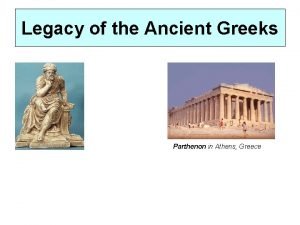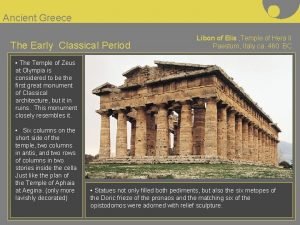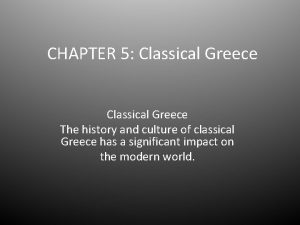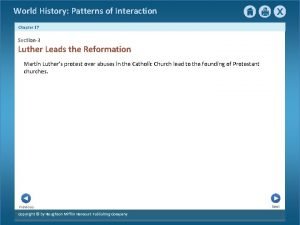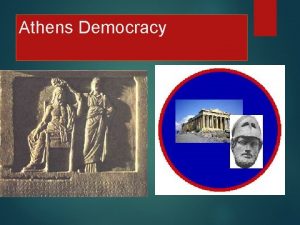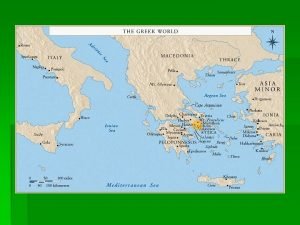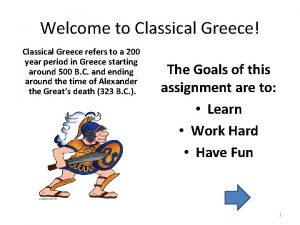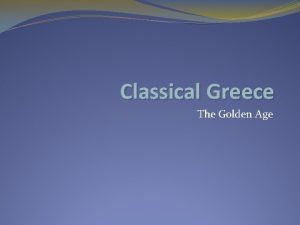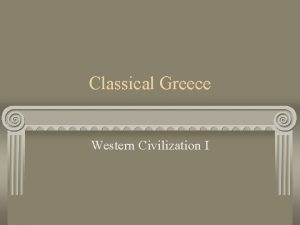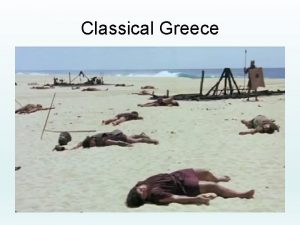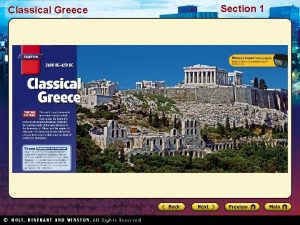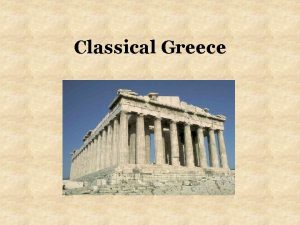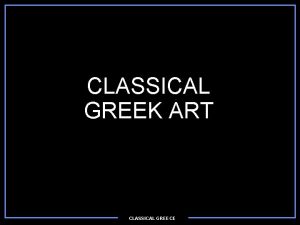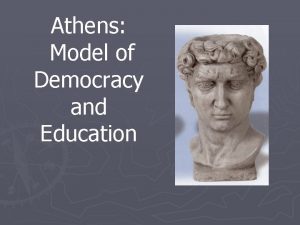Classical Greece Athens World History Classical Greece Athens
















- Slides: 16

Classical Greece- Athens World History

Classical Greece- Athens World History What kind of political structures did Greek citystates have? Some had monarchies. (A single person or king rules) Some had aristocracies. (A small group of nobles or wealthy people rule)

Classical Greece- Athens World History What kind of political structures did Greek citystates have? Some had monarchies. (A single person or king rules) Some had aristocracies. (A small group of nobles or wealthy people rule) Some formed oligarchies. (A few people rule over everyone else. )

Classical Greece- Athens World History What kind of political structures did Greek citystates have? Some had monarchies. (A single person or king rules) Some had aristocracies. (A small group of nobles or wealthy people rule) Some formed oligarchies. (A few people rule over everyone else. ) Sometimes one person would seize control and become ruler. They were called tyrants.

Classical Greece- Athens World History What kind of political structures did Greek citystates have? Sometimes one person would seize control and become ruler. They were called tyrants. What made Athens different? Athenian citizens participated directly in their government. This is a democracy.

Classical Greece- Athens World History What kind of political structures did Greek citystates have? Sometimes one person would seize control and become ruler. They were called tyrants. What made Athens different? Athenian citizens participated directly in their government. This is a democracy. How did this system come to into place? Around 600 BCE A legal code was set in place that said rich and poor were equal under the law.

Classical Greece- Athens World History How did this system come into place? Around 600 BCE A legal code was set in place that said rich and poor were equal under the law. Around 590 BCE laws were set in place that outlawed slavery. And all citizens were put into categories based on wealth.

Classical Greece- Athens World History How did this system come into place? Around 600 BCE A legal code was set in place that said rich and poor were equal under the law. Around 590 BCE laws were set in place that outlawed slavery. And all citizens were put into categories based on wealth. There were four classes of people. Only the top three could hold political office.

Classical Greece- Athens World History How did this system come into place? Around 600 BCE A legal code was set in place that said rich and poor were equal under the law. Around 590 BCE laws were set in place that outlawed slavery. And all citizens were put into categories based on wealth. There were four classes of people. Only the top three could hold political office.

Classical Greece- Athens World History How did this system come into place? There were four classes of people. Only the top three could hold political office. Around 500 BCE further reforms broke up this nobility. All citizens were allowed to propose laws and reforms to the Council of 500.

Classical Greece- Athens World History How did this system come into place? There were four classes of people. Only the top three could hold political office. Around 500 BCE further reforms broke up this nobility. All citizens were allowed to propose laws and reforms to the Council of 500. Council members were chosen at random by lot. Citizenship was limited to adult male property owners.

Classical Greece- Athens World History How did this system come into place? Council members were chosen at random by lot. Citizenship was limited to adult male property owners. How were the Athenians educated? Wealth boys received formal education. School began around 7 years old.

Classical Greece- Athens World History How were the Athenians educated? Wealth boys received formal education. School began around 7 years old. They studied reading, poetry, grammar, history, mathematics, and music.

Classical Greece- Athens World History How were the Athenians educated? Wealth boys received formal education. School began around 7 years old. They studied reading, poetry, grammar, history, mathematics, and music. Since they would be expected to debate in the assembly they were trained in logic and public speaking (rhetoric)

Classical Greece- Athens World History How were the Athenians educated? Since they would be expected to debate in the assembly they were trained in logic and public speaking (rhetoric) When boys got older they went to military school. Girls did not go to school, they were educated at home.

Classical Greece- Athens World History How were the Athenians educated? Since they would be expected to debate in the assembly they were trained in logic and public speaking (rhetoric) When boys got older they went to military school. Girls did not go to school, they were educated at home. They were taught how to weave cloth, take care of children, prepare meals. Be good wives and mothers.
 Greek philosophers who contributed in physical education
Greek philosophers who contributed in physical education Athens greece
Athens greece Map of greece
Map of greece Ap world history chapter 25 africa and the atlantic world
Ap world history chapter 25 africa and the atlantic world Dangerous world tour setlist
Dangerous world tour setlist Classical period greece
Classical period greece Lesson 3 classical greece
Lesson 3 classical greece Chapter 5 classical greece
Chapter 5 classical greece A brief history of classical music
A brief history of classical music Also history physical
Also history physical Leq for ap world history
Leq for ap world history Total war world history definition
Total war world history definition Chapter 17 section 3 luther leads the reformation
Chapter 17 section 3 luther leads the reformation World history spring final exam review answers
World history spring final exam review answers Ap world history jeopardy
Ap world history jeopardy Chapter 32 assessment world history
Chapter 32 assessment world history Chapter 30 section 2 world history
Chapter 30 section 2 world history

